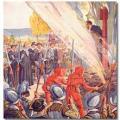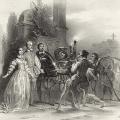407. Maria Rosa Antognazza on Early Modern Toleration
An interview on the nature of religious tolerance, and the forms it took during the Reformation and in the thought of early modern thinkers like Locke and Leibniz.
Maria Rosa Antognazza is Professor of Philosophy at King's College London.
Themes:
• M.R. Antognazza, “Leibniz’s Doctrine of Toleration: Philosophical, Theological and Pragmatic Reasons,” in J. Parkin and T. Stanton (eds), Natural Law and Toleration in the Early Enlightenment (Oxford: 2013), 139-64
• M.R. Antognazza, “Reason, Revelation, and Arguments for the Deity," in A. Garrett (ed.),The Routledge Companion to Eighteenth Century Philosophy (Abingdon: 2014), 145-66.
• M.R. Antognazza, Leibniz: a Very Short Introduction (Oxford: 2016).
• M.R. Antognazza, “Ecclesiology, Ecumenism, and Toleration,” in M.R. Antognazza (ed.), The Oxford Handbook of Leibniz, ed. (Oxford: 2018).
• M.R. Antognazza, “Belief, Religious Belief, and Faith,” Rivista di Filosofia 110 (2019), 283-306.
• M.R. Antognazza, “Truth and Toleration in Early Modern Thought,” in I. Hunter and R. Whatmore (eds), Philosophy, Rights, and Natural Law (Edinburgh: 2019).
• M.R. Antognazza, “Knowledge and Religious Belief,” Think 20 (2021), 39-52.







Comments
Your discussion of the principle of Cuius regio, eius religio
I couldn’t believe your discussion of the legal principle of Cuius regio, eius religio (and I actually have hard time to believe the Wikipedia page on the topic as well). You have completely missed the situation in the states of the Holy Roman Empire (namely Bohemia and Silesia, but there may be others), where the true religious tolerance was already a law (since 1485 and 1609), and where the introduction of this principle by the Peace of Westphalia in 1648 (which was the recognition of the law of 1624) lead (together with remaining strong serfdom) to the violent religious persecution and violent Recatholicisation.
In reply to Your discussion of the principle of Cuius regio, eius religio by Matěj Cepl
Cuius regio
Well, bear in mind this was a pretty wide-ranging discussion and focused on philosophy, not history - the point was not to tour around Europe talking about the situation in every region. But actually I do intend to come back around to the context you mention later on, when I cover early modern philosophy in Germany and its environment there will be more stuff on Eastern Europe than we have done so far.
In reply to Cuius regio by Peter Adamson
Re: Cuius Regio
Of course, I understand that the situation is more complicated (when it isn’t?), but I was surprised when the answer to your question whether this doctrine was beneficial or not for the cause of the religious tolerance her answer was (as far as I understood it) rather unequivocal approval. Here in the Czech historians are rather in agreement that it was mostly disaster. Yes, even if it was meant well (and it most likely wasn’t in case of the Austrian Habsburgs) the results were hugely different in the what’s-the-current-Germany with hundreds of tiny principalities and more relaxed rules of serfdom, so that the religious dissenters could just move to the other city over the hill. In the Czech lands where serfdom was quite harsh and the Czech Kingdom was by far the biggest unit of the Holy Roman Empire, it has been always understood as a tool of the religious oppression. Evangelical dissenters were in the Czech lands (mostly what’s now Northern Moravia and Silesia) executed long through the reign of Maria Theresa.
In reply to Re: Cuius Regio by Matěj Cepl
Cuius regio
Ah, that is indeed interesting. It hadn't occurred to me how different the effects would be given states of different size. Thanks for this insight, as I say I hope to return to the Czech/Eastern European context in further episodes down the line!
Add new comment